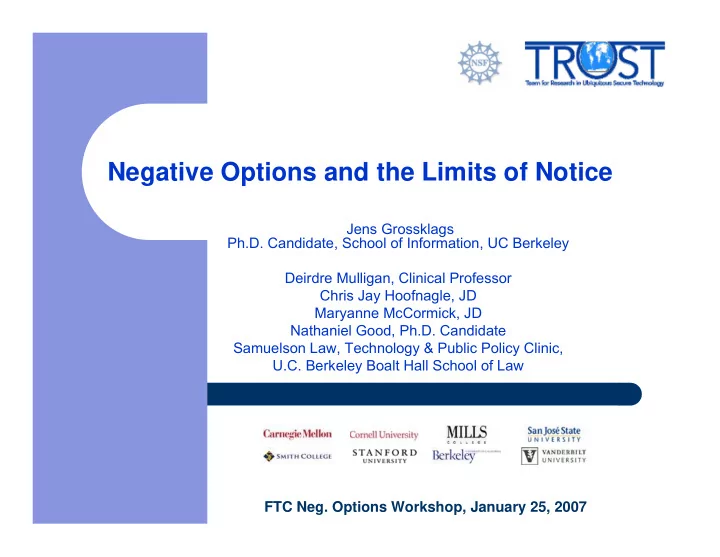

Negative Options and the Limits of Notice Jens Grossklags Ph.D. Candidate, School of Information, UC Berkeley Deirdre Mulligan, Clinical Professor Chris Jay Hoofnagle, JD Maryanne McCormick, JD Nathaniel Good, Ph.D. Candidate Samuelson Law, Technology & Public Policy Clinic, U.C. Berkeley Boalt Hall School of Law FTC Neg. Options Workshop, January 25, 2007
Overview Short notices produce better outcomes I. ∴ Notices should be short, conspicuous But regret is still present, and framing can II. manipulate behavior detrimentally ∴ Notice should include total cost Delayed consequences, inertia creates III. suboptimal decisions ∴ Easy cancellation necessary FTC Neg. Options Workshop, January 25, 2007 2
I. Experiment: EULA v. Short Notice Subjects were presented with an installation dialog � for three potentially harmful, popular programs We removed brand information from programs � Three subexperiments: � Standard EULA (64 subjects) 1. Standard EULA + short notice before installation (80 2. subjects) Standard EULA + short notice after installation (78 3. subjects) FTC Neg. Options Workshop, January 25, 2007 3
Subexperiment I: Only Standard EULA FTC Neg. Options Workshop, January 25, 2007 4
Terms Are Not Read • Majority does not read 1800 EULA information 1600 1400 � Median ≈ 45 sec Reading time (in sec) 1200 � Time required to pass through EULA is 1000 more than 10 min per 800 program 600 400 200 0 0 10 20 30 40 50 60 Number of subjects (ordered by reading time) Program X Program Y Program Z Graph of reading time for individuals that installed programs (in seconds) FTC Neg. Options Workshop, January 25, 2007 5
EULA Only: Most Install Potentially Harmful Programs � Most people install all three programs – Programs X: 70.3%; Y: 90.6; Z: 85.9% � Installations are regretted – Only few consumers would keep potentially harmful programs installed after consultation; Programs X: 2.2%; Y: 62.1%; Z: 18.2% � Consumers do care – Some differentiate between programs based on standard EULA – Strong response to EULA summary – In context of privacy and spyware: Motivates use of short notices (favored model by FTC, EU, companies etc.) FTC Neg. Options Workshop, January 25, 2007 6
Subexperiments II & III: Short Notices Added FTC Neg. Options Workshop, January 25, 2007 7
Short Notices Reduce Bad Decisions Pre Post 100% � Users install fewer 90.6% 90% potentially harmful 85.9% 80% programs with Pre- 71.8% 70.3% 67.5% 70% and Post- Notice 60% Program X 50% Program Y Program Z � Many users keep less 40% 30.8% 29.5% risky program 30% 23.8% 22.5% 20% 10% 0% EULA only EULA and Pre notice EULA and Post notice Programs installed (in percent) FTC Neg. Options Workshop, January 25, 2007 8
Short Notices Are Better, But Consumers Still Regret Outcomes � Regret significantly lower in short notice subexperiments, but still high overall � Up to 70% still regret decision to install in Pre- notice subexperiment, 78% in Post � Experiment shows that notices can be largely effective FTC Neg. Options Workshop, January 25, 2007 9
Short Notices: Regret & Other Problems Endure… � The terms of the bargain are not fully understood � Optimism colors estimates of risk, ability to make decisions, and interpretation of ambiguous terms � Excitement often causes them not to read terms � Even the best notice practices have some limits… FTC Neg. Options Workshop, January 25, 2007 10
II. Limits of Disclosure � “Hidden costs” cause suboptimal decision making � Even costs framed as “fees” affect decisions – Experiment in eBay auction setting showed that increasing shipping costs while lowering opening price attracts higher number of bidders and increases sellers’ revenue (Hossain & Morgan) � ∴ Disclosure should include total cost FTC Neg. Options Workshop, January 25, 2007 11
III. Delayed Consequences Complicate Decisions � Because negative options involve charges over time, individuals may depart from perfect rational choice � Models developed in psychology and economics describe and explain human behavior under these circumstances FTC Neg. Options Workshop, January 25, 2007 12
Effects of Delayed Consequences � Overwhelming incentives to sign up – Individuals are enticed by immediate benefits � Driven by opt-out enrollment; free-to-pay conversions – Reinforced by limited information/awareness about total costs � Consumer intent easily can be frustrated – Procrastination of cancellation decision; inertia (or status quo bias) – Reinforced by burdensome cancellation procedures FTC Neg. Options Workshop, January 25, 2007 13
Recommendations � Short, conspicuous notices will help – Consider that pool of consumers is heterogeneous � “Total cost of ownership” information desirable – Disclosures should prevent sellers from hiding costs or moving fees to the “back of the product” � “Mutuality” in cancellation procedures – Protect consumer intent with cancellation procedures that are as facile as enrollment procedures FTC Neg. Options Workshop, January 25, 2007 14
Recommend
More recommend